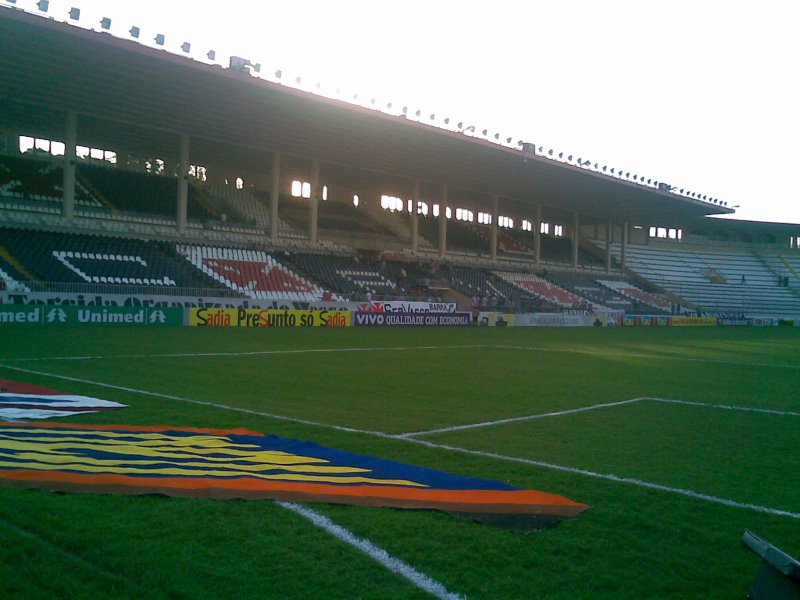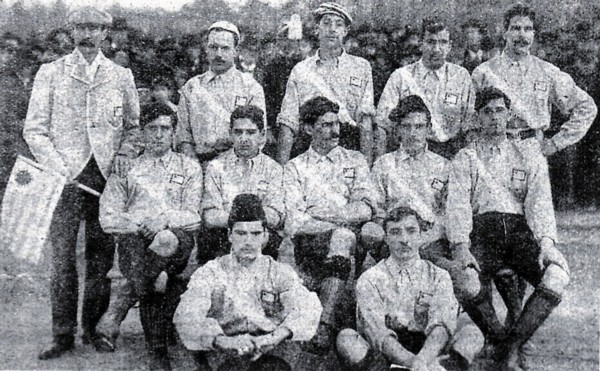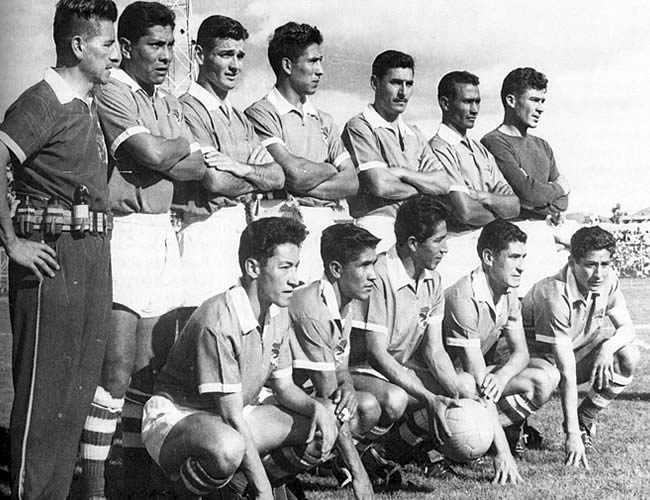|
Danilo Faria Alvim
Danilo Alvim Faria (3 December 1920 – 16 May 1996) was a Brazilian footballer. He was a member of the ill-fated Brazilian 1950 World Cup team. One of the greatest center-halves in the World during his prime, he was renowned as a very sophisticated and elegant player who possessed fine ball control and accurate long range passing. Club career Danilo Alvim was an amateur playing with America-RJ when Flávio Costa's Rio de Janeiro squad practiced against them in 1941. He was asked to fill in for one of the injured players and so impressed the famous coach that he was asked to join the squad. At first he thought it was a joke, but when he realized it was true he went out to celebrate. On his way back home he was hit by a car and had his leg broken (in 39 places according to some sources). In 1942 he came back to America and was cut by the manager to save costs. Rather than cutting him outright the team's directors sent him to Canto do Rio where he led the team to a Rio d ... [...More Info...] [...Related Items...] OR: [Wikipedia] [Google] [Baidu] |
Rio De Janeiro
Rio de Janeiro, or simply Rio, is the capital of the Rio de Janeiro (state), state of Rio de Janeiro. It is the List of cities in Brazil by population, second-most-populous city in Brazil (after SĂŁo Paulo) and the Largest cities in the Americas, sixth-most-populous city in the Americas. Founded in 1565 by the Portuguese people, Portuguese, the city was initially the seat of the Captaincy of Rio de Janeiro, a domain of the Portuguese Empire. In 1763, it became the capital of the State of Brazil, a List of states of the Portuguese Empire, state of the Portuguese Empire. In 1808, when the Transfer of the Portuguese Court to Brazil, Portuguese Royal Court moved to Brazil, Rio de Janeiro became the seat of the court of Queen Maria I of Portugal. She subsequently, under the leadership of her son the prince regent John VI of Portugal, raised Brazil to the dignity of a kingdom, within the United Kingdom of Portugal, Brazil and the Algarves, United Kingdom of Portugal, Brazil, and Algar ... [...More Info...] [...Related Items...] OR: [Wikipedia] [Google] [Baidu] |
1949 South American Championship
The 1949 South American Championship was the 21st edition of the Copa América, the main national team association football, football competition in South America. It was held in, and won by, Brazil. Paraguay finished as runner-up while Argentina national football team, Argentina withdrew from the tournament. This achievement ended a 27-year streak without official titles for the Brazilians. The last one had been in the 1922 South American Championship, also played on Brazilian soil. Jair Rosa Pinto from Brazil was the top scorer of the tournament, with nine goals. Squads For a complete list of participating squads, see: ''1949 South American Championship squads'' Venues Final round ---- ---- ---- ---- ---- ---- ---- ---- ---- ---- ---- ---- ---- ---- ---- ---- ---- ---- ---- ---- ---- ---- ---- ---- ---- ---- ---- Play-off A playoff match was played between Brazil and Paraguay to determine the champion. Result Goalscorers 9 goals * Jair ... [...More Info...] [...Related Items...] OR: [Wikipedia] [Google] [Baidu] |
Death Of Ayrton Senna
On 1 May 1994, Brazilian Formula One driver Ayrton Senna was killed after his car crashed into a concrete barrier while he was leading the 1994 San Marino Grand Prix at the Imola Circuit in Italy. The Supreme Court of Cassation of Italy ruled that mechanical failure was the cause of the crash, as post-crash analysis found that Senna's steering column had snapped around the time that his car was about to round the Tamburello corner. Senna's death was the capstone to one of the darkest weekends in Formula One history. The previous day, Austrian driver Roland Ratzenberger had died when his car crashed during qualifying. Several other collisions took place that weekend, including a serious one involving Rubens Barrichello. Ratzenberger and Senna's crashes were the first fatal accidents to occur during a Formula One race meeting since Riccardo Paletti died at the 1982 Canadian Grand Prix. Senna's death, as well as the other events of the race weekend, helped trigger signific ... [...More Info...] [...Related Items...] OR: [Wikipedia] [Google] [Baidu] |
Uruguay V Brazil (1950 FIFA World Cup)
The match between Uruguay national football team, Uruguay and Brazil national football team, Brazil was the decisive match of the final stage at the 1950 FIFA World Cup. It was played at the Maracanã Stadium in the then-capital of Brazil, Rio de Janeiro, on 16 July 1950. Unlike in other editions of the tournament, which conclude with a one-off List of FIFA World Cup finals, final, the 1950 winner was determined by 1950 FIFA World Cup final round, a final group stage, where four teams played in a Round-robin tournament, round-robin format. With Brazil topping the group, one point ahead of Uruguay going into the final round of matches, Uruguay needed a win while Brazil needed only to avoid defeat to become the world champions; neither of the other two teams, Spain and Sweden, could finish first. Thus, the match is often regarded as the ''de facto'' final of the 1950 World Cup. Uruguay won 2–1; Brazil took the lead shortly after half-time thanks to a goal by Friaça, but Juan Al ... [...More Info...] [...Related Items...] OR: [Wikipedia] [Google] [Baidu] |
Uruguay National Football Team
The Uruguay national football team (), nicknamed ''La Celeste'' ("The Sky Blue") and ''Los Charrúas'' ("The Charrúa, Charrúas"), have represented Uruguay in international men's Association football, football since their first international match in 1902 and is administered by the Uruguayan Football Association, Asociación Uruguaya de Fútbol (), the governing body of football in Uruguay, which is a founding member of CONMEBOL since 1916 and a member of FIFA since 1923. It was also a member of Panamerican Championship#Panamerican Football Confederation, PFC, which was the attempt at a unified confederation of the Americas from 1946 to 1961. Uruguay's home stadium is the Estadio Centenario, and they have been coached by Marcelo Bielsa since 2023. Considered one of the most successful national teams in international competitions and by FIFA as "football's first global powerhouse," Uruguay has won four world FIFA–organized championships, two football at the Summer Olympics, Ol ... [...More Info...] [...Related Items...] OR: [Wikipedia] [Google] [Baidu] |
Copa Libertadores
The CONMEBOL Libertadores, also known as Copa Libertadores de América (), is an annual continental club football competition organized by CONMEBOL since 1960. It is the highest level of competition in South American club football. The tournament is named after the '' Libertadores'' (Spanish and Portuguese for ''liberators''), the leaders of the Spanish American wars of independence and Brazilian Independence, so a literal translation of its former name into English is "''Liberators of America Cup''". The competition has had several formats over its lifetime. Initially, only the champions of the South American leagues participated. In 1966, the runners-up of the South American leagues began to join. In 1998, Mexican teams were invited to compete and contested regularly from 2000 until 2016. In 2000 the tournament was expanded from 20 to 32 teams. Today at least four clubs per country compete in the tournament, with Argentina and Brazil having the most representatives (six and ... [...More Info...] [...Related Items...] OR: [Wikipedia] [Google] [Baidu] |
South American Club Championship (football)
The South American Championship of Champions (, ) was a football competition played in Santiago, Chile in 1948 and the first continental-wide clubs football tournament in South America. Hosted and organized by Chilean club Colo Colo with the aid of then president of CONMEBOL Luis Valenzuela, it was played between February 11 and March 17. Brazil's Vasco da Gama won the competition after earning the most points in the round-robin tournament. The tournament was the first tournament ever played to determine the South American club champion, and thus is seen as the precursor to the Copa Libertadores and is considered, along with the Copa Aldao (also named "Copa RĂo de La Plata"), as an important stepping stone towards its creation. Overview Since the early 1910s, Argentine and Uruguayan clubs disputed the Copa Aldao, a tournament played between the national champions of each nation's top national leagues. The great success of this tournament gave birth to the idea of a continenta ... [...More Info...] [...Related Items...] OR: [Wikipedia] [Google] [Baidu] |
Flávio Costa
Flávio Rodrigues da Costa (14 September 1906 – 22 November 1999) was a Brazilian football player and manager. He managed the Rio de Janeiro clubs Vasco da Gama and Flamengo, as well as Colo Colo of Chile, and FC Porto of Portugal. Costa coached the Brazilian squad at the 1950 FIFA World Cup; the loss against Uruguay has been described as Brazil's greatest humiliation of the 20th century. As a consequence of his World Cup failure, he lost his prestige among the Brazilian press and supporters of the national team. However, he was again manager of the Brazilian team in 1955 and in 1956. He died in Rio de Janeiro in November 1999. Playing career From 1926 until 1936, Costa played 145 matches, mostly as a midfielder, in the black and red jerseys of Flamengo and scored 15 goals in the process. From September 1934 forward he was player-manager A player–coach (also playing coach, captain–coach, or player–manager) is a member of a sports team who simultaneously holds both pl ... [...More Info...] [...Related Items...] OR: [Wikipedia] [Google] [Baidu] |
America Football Club (Rio De Janeiro)
America Football Club, usually abbreviated to America-RJ or simply America, is a List of football clubs in Brazil, Brazilian football team based in the city of Rio de Janeiro, in the northern neighborhood of Tijuca. The team competes in Campeonato Carioca Série A2, the second tier of the Rio de Janeiro (state), Rio de Janeiro State football leagues in Brazil, state football league. Founded on 18 September 1904, the club competed in the Campeonato Brasileiro Série A several times, winning the Campeonato Carioca, state championship seven times. The club's home stadium is the Estádio Giulite Coutinho, which has a capacity of 16,000. They play in red shirts, white shorts and red socks. The football anthem composer Lamartine Babo was a supporter of America. America's mascot is a devil. America also sponsors a beach American football team, the America Red Lions. History On 18 September 1904, Alberto Koltzbucher, Alfredo Guilherme Koehler, Alfredo Mohrsted, Gustavo Bruno ... [...More Info...] [...Related Items...] OR: [Wikipedia] [Google] [Baidu] |
Centre-half
In the sport of association football, a defender is an outfield player whose primary role is to stop attacks during the game and prevent the opposition from scoring. Defenders fall into four main categories: centre-backs, full-backs, sweepers, and wing-backs. The centre-back and full-back positions are most common in modern formations. The sweeper and wing-back roles are more specialised, often limited to certain formations dependent on the manager's style of play and tactics. Centre-back The centre-back (also known as a central defender or centre-half, as the modern role of the centre-back arose from the centre-half position) defends in the area directly in front of the goal and tries to prevent opposing players, particularly centre-forwards, from scoring. Centre-backs accomplish this by blocking shots, tackling, intercepting passes, contesting headers and marking forwards to discourage the opposing team from passing to them. Centre-backs are often tall and positioned ... [...More Info...] [...Related Items...] OR: [Wikipedia] [Google] [Baidu] |
1963 South American Championship
The 1963 Copa AmĂ©rica, South American Championship was held in Bolivia between 10 and 31 March 1963. It was won by Bolivian Football Federation, Bolivia with Paraguayan Football Association, Paraguay second. This is, so far, Bolivia's only Copa America title. Squads For a complete list of participating squads see: ''1963 South American Championship squads'' Venues Final round was not invited due to the Lauca River, Lauca River conflict with Bolivia. withdrew due to the designation of La Paz as a tournament site. did not enter. ---- ---- ---- ---- ---- ---- ---- ---- ---- ---- ---- ---- ---- ---- ---- ---- ---- ---- ---- ---- ---- Result Goal scorers With six goals, Carlos Alberto Raffo of Ecuador is the top scorer in the tournament. In total, 91 goals were scored by 40 different players, with none of them credited as own goal. ;6 goals * Carlos Alberto Raffo ;5 goals * Mario RodrĂguez (Argentine footballer), Mario RodrĂguez * Máximo AlcĂ ... [...More Info...] [...Related Items...] OR: [Wikipedia] [Google] [Baidu] |







